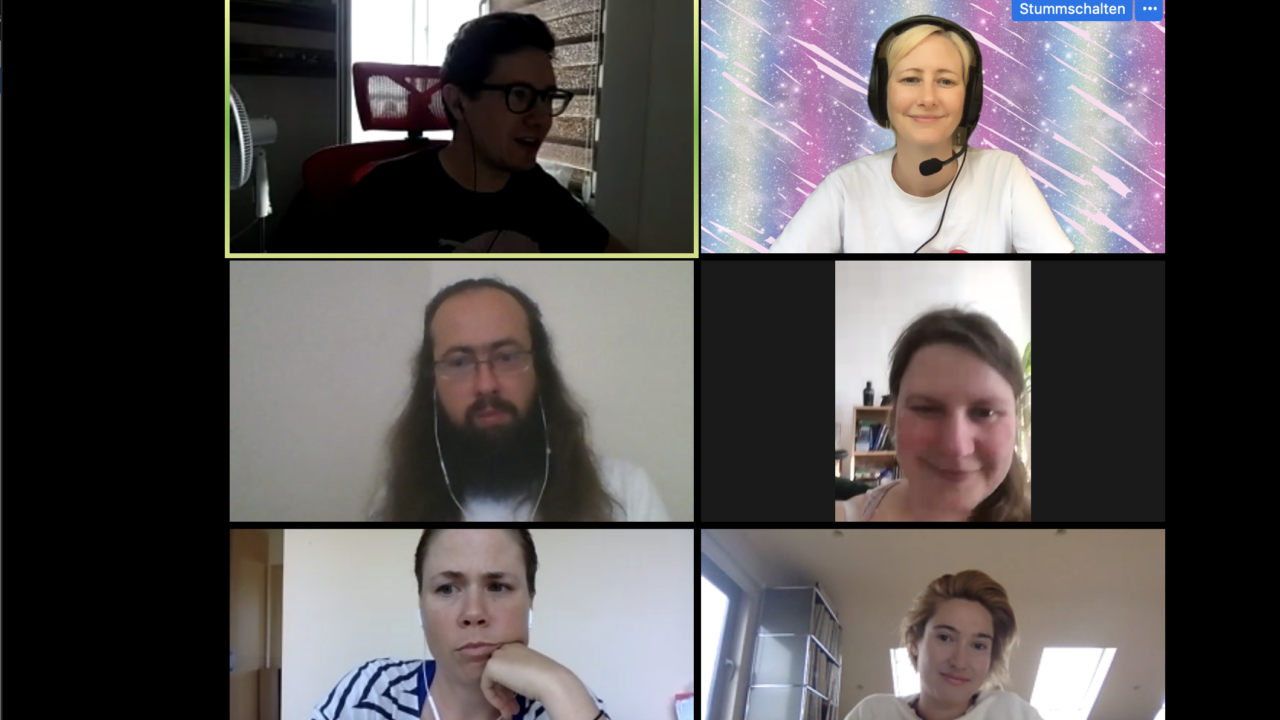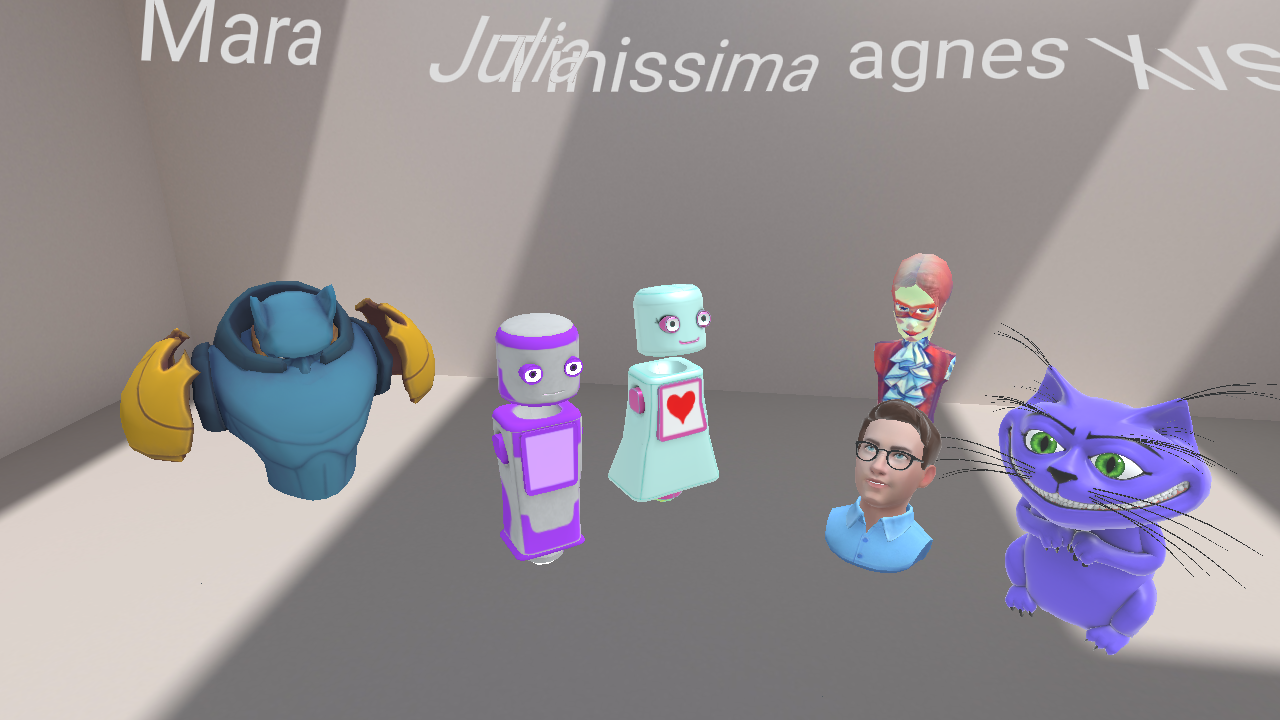Imagining and connecting a transnational community
3 Jul 2020
We spoke to Tina Sauerlaender from Germany, Julia Hartmann from Austria, Ágnes-Karolina Bakk from Hungary, Gleb Divov from the independent Republic of Užupis (Vilnius, Lithuania), Nikita Khudiakov from Ukraine and Mara-Johanna Kolmel from the UK. The curators from KARA AGORA talked about the goal of their project and what it means when it comes to European solidarity and public space.

KARA AGORA
KARA AGORA is a participatory online Art and Research Center. Through various cultural formats using virtual worlds on the Internet, European citizens are invited to become active participants in imagining a transnational community. Art and transdisciplinary education become the tool and source for an inclusive dialogue. Individual stories and knowledge are shared and amplified between physically distanced bodies in the online world.
The project is organized by a European team of curators and by combining their expertise, KARA AGORA offers a public virtual space, where solidarity can be experienced beyond closed borders. During its running time, KARA AGORA will host a series of participatory events and exhibitions accessible through the freely available virtual 3D environment of Mozilla Hubs, which aim at bringing particular groups of people from different places together. Moreover, KARA AGORA wants to address and raise social, personal, ecological, and political questions concerning Europe, its regions, and its inhabitants.
European solidarity
When asked what their project means in terms of European solidarity, Nikita explained “We draw our mission from the Greek agora, a term used in many European languages. An agora was the large and open central public space in ancient Greek city-states. It was the social hub, a place of debate and exchange of ideas. Kara means “dear”, “beloved” or “precious” in Esperanto.
The central idea of this universal language—to foster world peace—aligns with our beliefs for KARA AGORA. It stands for open debate, the exchange of ideas and creative dialogues among artists and community members. We aim to speculate upon a new European community for the future that is full of love, compassion, and respect for each other. KARA AGORA celebrates a culture of solidarity and empathy by emphasizing and amplifying what moves and connects us in these challenging times.” Tina adds.
Public space
What does KARA AGORA mean in terms of European public space? Julia states that “KARA AGORA sees the current crisis as an opportunity to expand social experiences and connections between European citizens—and netizens respectively—by creating cultural events in virtual online spaces. As a European Art & Research Center we highlight possible united futures for all Europeans, and we expound sustainable possibilities for the cultural life of Europe that will outlast the quarantine.”

The role KARA AGORA plays in expanding social experiences and connections between European citizens during the current crisis.
“With Europe under quarantine, online communication tools have become not just a surrogate for real-life meetings, but the crucial tool for social exchange. We regard this sudden interconnectedness as a unique possibility to grow further together as a network of European citizens. By creating a virtual and transnational cultural centre, we implement spaces to collaborate, learn, play, discuss, share stories, network, donate, and interact beyond closed borders.” Gleb explains.
KARA AGORA combines the expertise, cultural backgrounds, professions, experiences, and languages of curators from six different European countries and brings together individuals from diverse communities across Europe. “Through carefully curated cultural programs, we want to enable these communities to use digital technologies in imaginative ways – to create new networks, to make sustainable, trusting, and even unexpected connections with other people beyond this current crisis. To further support solidarity across Europe, all of KARA AGORA’s programs will ask its participants and visitors to directly donate to a Greek NGO supporting refugees and locals in Lesbos.”, Mara elaborates.
The mission
“With the project, we aim to reach European citizens, who want to imagine a future together, participate and interact with each other, share personal stories, encourage critical thinking, create inclusivity and intersectionality. We use the new cross-platform online tool Mozilla Hubs to connect cultural workers with culturally affiliated individuals and communities,” says Ágnes.
Anyone interested in art, research, cultural exchange, interdisciplinary creation, and transnational communication is welcome to visit the space and participate in its programmes. KARA AGORA marks the starting point of a European centre and network that will continue to grow after the crisis. They will document every activity and meeting, create a project website and Facebook groups and other platforms for sustainable cross-European exchange for the future.
The project
During KARA AGORA’s running time, the Art Center will be based in the freely accessible virtual 3D environment of Mozilla Hubs. It will host four participatory experimental formats, which will take place in specially designed virtual spaces, including galleries, an event space, and a meeting area. Using cross-platform technologies (mobile phone, computer, VR headset), each event is conceived by bringing unusual groups of people from different European countries together that addresses and raise social, personal, ecological and political questions concerning Europe, its regions and its inhabitants. These four sub-projects are curated individually and will be held during September and November 2020.
1. “Speculative Art & Science Playroom and Hackathon”
One-week workshop in interactive virtual space through which artists and scientists create new answers for future European issues and social challenges. (Curated by Ágnes-Karolina Bakk, Budapest, Hungary, founder zip-scene.mome.hu & Nikita Khudiakov (Kyiv, Ukraine, Coordinator, frontierfest.com.ua)
2. “Bunch of Kunst in Quarantine”
International group exhibition in Mozilla Hubs that reflects on creative life in a viral vacuum outside dominant national narratives. (Curated by Mara-Johanna Kolmel, London, UK, Co-Director a-by-p.com) and Tina Sauerlaender, Berlin, Germany, Head Curator, peertospace.eu)
3. “Net Works”
Exhibition and talks about our global network society from a historical, socio-political and queer-feminist perspective. It will include a diverse range of artworks, the presentation of transnational networkings and discuss pressing topics with community leaders. (Curated by Julia Hartmann, Vienna, Austria, Co-Founder saloonwien.at)
4. “United Virtual Residency (uVR)”
Month-long online residency with workshops, talks and exhibitions for European artists.
uVR connects cross-border cross-genre artists to create a technology-connected immersive story with an open ending, which will be a creative vision and virtual proposal for Europe’s challenges. (Curated by Gleb Divov, Minister of the Republic of Užupis, Lithuania and FAYR Ecosystem’s (www.fayr.org) president and visioner)
Grant awarded: €30,000
